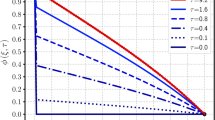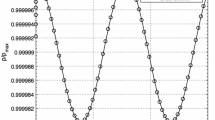Abstract
IN free-boundary diffusion experiments a boundary between two solutions of different concentrations is formed in a cylindrical cell and the evolution with time of the concentration distribution is examined. For the evaluation of the diffusion coefficient from the experimental data several methods are available, for example, the moment method and the area method. In these methods the existence of an initially sharp boundary between the two solutions is in general presumed. However, it will be shown that the moment method is valid for very general boundary conditions, a fact that seems to have been overlooked in the past.
This is a preview of subscription content, access via your institution
Access options
Subscribe to this journal
Receive 51 print issues and online access
$199.00 per year
only $3.90 per issue
Buy this article
- Purchase on Springer Link
- Instant access to full article PDF
Prices may be subject to local taxes which are calculated during checkout
Similar content being viewed by others
References
Jost, W., Diffusion, 48 (Dr. D. Steinkopff Verlag, Darmstadt, 1957).
Kraus, G., J. Chem. Phys., 20, 200 (1952).
Author information
Authors and Affiliations
Rights and permissions
About this article
Cite this article
VINK, H. Evaluation of Diffusion Coefficients in Free-boundary Diffusion Experiments. Nature 205, 73 (1965). https://doi.org/10.1038/205073a0
Published:
Issue Date:
DOI: https://doi.org/10.1038/205073a0
Comments
By submitting a comment you agree to abide by our Terms and Community Guidelines. If you find something abusive or that does not comply with our terms or guidelines please flag it as inappropriate.



